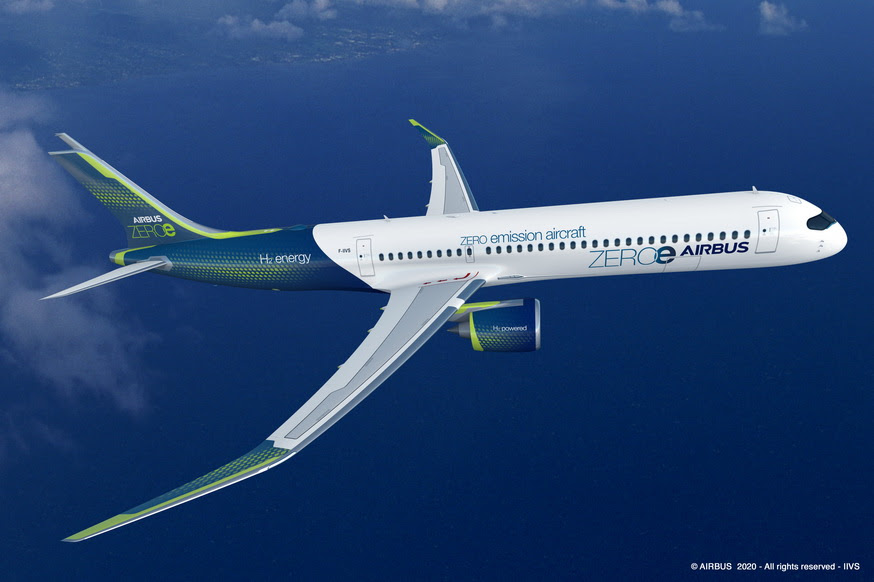The three decarbonized aircraft concepts presented by Airbus explore various technological runways and aerodynamic configurations with the goal of commissioning in 2035.
Codename: "ZEROe"
Airbus has just unveiled three possible concepts of a decarbonized or zero-emission commercial aircraft, all codenamed "ZEROe" and exploring various technological tracks and aerodynamic configurations:
- a concept of turbojet (120-200 passengers) capable of performing intercontinental flights of more than 3500 km and powered by a modified gas turbine running on hydrogen, instead of kerosene, by combustion. Liquid hydrogen will be stored and distributed through tanks behind the rear watertight bulkhead.
- a turboprop concept (capable of carrying up to 100 passengers) using a turboprop engine instead of a turbojet, also powered by hydrogen combustion in modified gas turbines, and capable of travelling more than 1800 km. An ideal option for short-haul flights.
-a concept of an integrated fuselage aircraft (up to 200 passengers), with a wing that blends into the aircraft's main fuselage and has a range comparable to that of the turbojet concept. The exceptionally wide fuselage offers multiple possibilities for hydrogen storage and distribution, as well as for cabin layout.
Hydrogen as a source of energy
All of these concepts use hydrogen as their main energy source. "I am convinced that hydrogen, used both in synthetic fuels and as a primary energy source, can significantly reduce the climate impact of aviation," says Guillaume Faury, Airbus President, who continues: "These concepts will allow us to explore the design and development of the first climate-neutral zero-emission commercial aircraft, which we want to put into service by 2035. The transition to hydrogen as a primary energy source, the solution chosen for these concepts, will require decisive action from the entire aviation ecosystem. Together, with the support of governments and industry partners, we can meet this challenge and promote renewable energy and hydrogen to ensure a sustainable future for the aviation sector. »
The aero ecosystem must follow
To meet these challenges, airports will need significant hydrogen transportation and refuelling infrastructure to meet the needs of day-to-day operations. Government support will be key to achieving these ambitious goals, through increased funding for research and technology, digital transformation and mechanisms that encourage the use of sustainable fuels, as well as the renewal of aircraft fleets, to enable airlines to remove older aircraft from service more quickly. , less environmentally friendly.
Découvrez cet article sur Air&Cosmos

